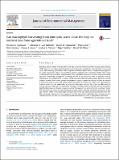Files in this item
Can macrophyte harvesting from eutrophic water close the loop on nutrient loss from agricultural land?
Item metadata
| dc.contributor.author | Quilliam, R.S. | |
| dc.contributor.author | van Niekerk, M.A. | |
| dc.contributor.author | Chadwick, D.R. | |
| dc.contributor.author | Cross, P. | |
| dc.contributor.author | Hanley, N. | |
| dc.contributor.author | Jones, D.L. | |
| dc.contributor.author | Vinten, A.J.A. | |
| dc.contributor.author | Willby, N. | |
| dc.contributor.author | Oliver, D.M. | |
| dc.date.accessioned | 2015-04-20T09:31:02Z | |
| dc.date.available | 2015-04-20T09:31:02Z | |
| dc.date.issued | 2015-04-01 | |
| dc.identifier | 168677099 | |
| dc.identifier | 9a5d77a5-cc4c-4eb2-b693-af21bd42a665 | |
| dc.identifier | 84922980952 | |
| dc.identifier | 000350519400025 | |
| dc.identifier.citation | Quilliam , R S , van Niekerk , M A , Chadwick , D R , Cross , P , Hanley , N , Jones , D L , Vinten , A J A , Willby , N & Oliver , D M 2015 , ' Can macrophyte harvesting from eutrophic water close the loop on nutrient loss from agricultural land? ' , Journal of Environmental Management , vol. 152 , pp. 210-217 . https://doi.org/10.1016/j.jenvman.2015.01.046 | en |
| dc.identifier.issn | 0301-4797 | |
| dc.identifier.uri | https://hdl.handle.net/10023/6517 | |
| dc.description | This work was supported by the UK Natural Environment Research Council, as part of the Recycling Biomass to Agricultural LANd: Capitalising on Eutrophication (ReBALAN:CE) project (NE/K015710/1) | en |
| dc.description.abstract | Eutrophication is a major water pollution issue and can lead to excessive growth of aquatic plant biomass (APB). However, the assimilation of nutrients into APB provides a significant target for their recovery and reuse, and harvesting problematic APB in impacted freshwater bodies offers a complementary approach to aquatic restoration, which could potentially deliver multiple wider ecosystem benefits. This critical review provides an assessment of opportunities and risks linked to nutrient recovery from agriculturally impacted water-bodies through the harvesting of APB for recycling and reuse as fertilisers and soil amendments. By evaluating the economic, social, environmental and health-related dimensions of this resource recovery from 'waste' process we propose a research agenda for closing the loop on nutrient transfer from land to water. We identify that environmental benefits are rarely, if ever, prioritised as essential criteria for the exploitation of resources from waste and yet this is key for addressing the current imbalance that sees environmental managers routinely undervaluing the wider environmental benefits that may accrue beyond resource recovery. The approach we advocate for the recycling of 'waste' APB nutrients is to couple the remediation of eutrophic waters with the sustainable production of feed and fertiliser, whilst providing multiple downstream benefits and minimising environmental trade-offs. This integrated 'ecosystem services approach' has the potential to holistically close the loop on agricultural nutrient loss, and thus sustainably recover finite resources such as phosphorus from waste. | |
| dc.format.extent | 585808 | |
| dc.language.iso | eng | |
| dc.relation.ispartof | Journal of Environmental Management | en |
| dc.subject | Aquatic plants | en |
| dc.subject | Ecosystem services | en |
| dc.subject | Environmental human health | en |
| dc.subject | Nutrient cycling | en |
| dc.subject | Organic resource recovery | en |
| dc.subject | Legacy P | en |
| dc.subject | GE Environmental Sciences | en |
| dc.subject | T-NDAS | en |
| dc.subject | SDG 2 - Zero Hunger | en |
| dc.subject | SDG 3 - Good Health and Well-being | en |
| dc.subject | SDG 6 - Clean Water and Sanitation | en |
| dc.subject | SDG 15 - Life on Land | en |
| dc.subject.lcc | GE | en |
| dc.title | Can macrophyte harvesting from eutrophic water close the loop on nutrient loss from agricultural land? | en |
| dc.type | Journal article | en |
| dc.contributor.institution | University of St Andrews. Geography & Sustainable Development | en |
| dc.identifier.doi | https://doi.org/10.1016/j.jenvman.2015.01.046 | |
| dc.description.status | Peer reviewed | en |
This item appears in the following Collection(s)
Items in the St Andrews Research Repository are protected by copyright, with all rights reserved, unless otherwise indicated.

